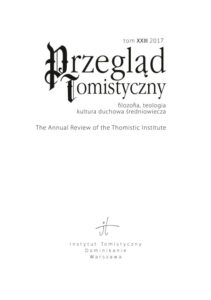MICHAŁ ZEMBRZUSKI, The Meaning of Donum Intellectus in the Thought of Bonaventure and Thomas Aquinas — Subordination of Understanding or Penetration in Depth

Volume XXIII: 2017
Philosophy — Theology— Spiritual Culture of the Middle Ages
ISSN 0860-0015
e-ISSN 2544-1000
SUMMARY
When Bonaventure and Thomas Aquinas considered the problem of the gifts of the Holy Spirit, they applied philosophical explanation to the theological issues taken by them. According to Bonaventure, subordination of understanding, which was the action of the gift of understanding, has a close relationship with the sentence, recognized by many thinkers of the Middle Ages: „if you will not believe, surely you shall not be established” (Is 7,9). The gift of understanding was the guarantor of the proper of intellectual functioning — subordination to the higher principles of understanding, removing the insufficiency of the human intellect. According to Bonaventure human intellect works based on the eternal light (higer light) when in the development of science tends to have certainty, which can be attained only by God. Aquinas emphasizes the determination of the gift of understanding efficiency, which is the cause of the Holy Spirit. The gift of understanding is a supernatural light, transmitted to man to know what is inside the thing known and what can be recognized in a natural way but imperfectly, as well as to the understanding of what constitutes the content of supernatural faith. Aquinas believed that the gift of understanding is used in the presentation of human action, which pertain to the standards of eternal law and the purpose of happiness in God. Knowledge about the nature of human activity, if it has to be governed by eternal law, exceeds the natural human abilities and demands the very gift of understanding.
